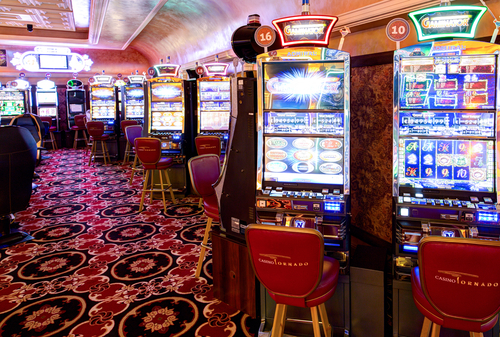
Casino entertainment have long been a engaging entertainment option, drawing countless of players from diverse cultures around the globe. From the opulent casinos of Las Vegas to the busy gambling halls of the Cotai Strip, these games serve as a link that brings together people across a variety of backgrounds. The allure of luck, strategy, and uncertainty entices not only those seeking to strike it rich but also those seeking a shared experience.
The significance of casino games extends well beyond the gaming floor. They often embody the cultural standards and principles of the communities in which they thrive. Games such as poker, 21, and the spinning wheel have integrated into the fabric of cultural phenomena, influencing multiple fields from movies to fashion. As we explore this fascinating intersection of gambling and society, we can better understand how casino games shape and are affected by the world around us.
Chronological Evolution of Gambling Games
The roots of gaming games can be tracked back to old civilizations, where betting in multiple forms was widely engaged in. In the East, around two thousand three hundred years before Christ, a type of luck game known as Keno was common, while in old Rome, soldiers would regularly bet on the outcomes of their games. The idea of using chance for entertainment and income developed over the ages, leading to the formation of more organized activities. By the final Middle Ages, gambling houses started to appear in European nations, notably in the Italian peninsula, which brought forth early versions of popular games still enjoyed today.
As betting increased fame in the continent, the 17th and 18th centuries saw the rise of casinos as dedicated locations for gaming. The earliest official gambling house, the Ridotto, was established in the city of Venice in the year 1638, offering activities like the game of Baccarat and the game Faro. This era marked a significant shifting point, as casinos started to draw not just the high society but also the growing middle-income class. https://bet88bn.com/ The complexity of games evolved, leading to the creation of new regulations and versions that improved the gaming experience.
In the 19th century, the industrial revolution and transformations in societal standards additionally altered the terrain of gambling games. The introduction of the game of roulette and new one-armed bandits attracted a larger clientele, and gaming houses became seen as acceptable fun. This time witnessed the worldwide proliferation of gambling, as casinos spread from the continent to the Western Hemisphere, culminating in the development of the legendary Las Vegas Boulevard in the 20th century. The development of gaming games has persisted into the present day, incorporating technology and online platforms, making them accessible to a global market.
# Cultural Importance in Various Societies
Casino games have profound social importance within numerous cultures throughout the planet. In Las Vegas, the very fabric of the urban landscape is woven around casinos, where gaming is not just a hobby but a fundamental aspect of leisure and social interaction. The dazzling lights and dynamic atmosphere attract millions, showcasing how casino games can influence local economical structures and local cultures. This surrounding transforms the notion of relaxation into an enriching encounter that shapes fashion, melodies, and even cinema.
In contrast, some societies treat wagering with an air of caution, viewing it through the lens of morality and heritage. A case in point, in numerous Oriental cultures, games like Mahjong and Pai Gow are full of history and carry significant social implications. These games are often played during gatherings and celebrations, fostering social ties and strengthening kinship ties. The act of engaging in these games goes above mere amusement, reflecting ethics such as respect for elders and the importance of collective enjoyment.
Meanwhile, in Western countries such as Monte Carlo and the Italian Peninsula, gambling activities serve as symbols of luxury and sophistication. The elegant atmosphere of these venues attracts both visitors and locals, upholding a sense of status and rarity. The art of poker and the strategic elements of games like the game of baccarat are esteemed, molding social dynamics and creating an allure that enthralls a heterogeneous audience. This emphasizes how casino games can both reflect and influence cultural attitudes towards danger, gain, and relationship building.
Financial Influence and Travel Industry
Gambling activities play a significant role in the economic landscape of many regions, particularly those that depend significantly on tourism. The revenue generated from casino operations fuels local economies, creating jobs not only within the casinos but also but also in connected industries such as hospitality, restaurant services, and recreation. This surge of tourists, drawn by the allure of gambling and the overall casino experience, stimulates expenditure across multiple businesses, contributing to the economic vitality of the region.
The presence of casinos often leads to the development of infrastructure, including lodging, public transit, and leisure amenities. These developments are essential in enhancing the overall tourist experience, making locations more attractive to tourists. Additionally, many casinos contribute in local communities through support of events and philanthropic initiatives, further integrating themselves into the community structure of the region. Such contribution not only supports economic growth but also fosters a positive reputation of the gambling sector.
Moreover, the worldwide appeal of casino games drives competitive tourism, with regions vying to attract gamblers from across the globe. Iconic locations like Las Vegas and Macau have become identifiable with casino culture, drawing millions each year. This competitive edge encourages creativity and diversification within the gaming industry, influencing trends in leisure and hospitality that extend beyond their limits. The ripple effects of this tourism extend wide, impacting local financial health and cultural exchanges on a worldwide scale.
